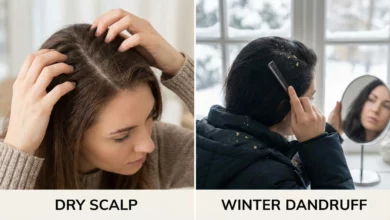We Reveal: The Lie Brands Tell You About “Hair Vitamins”
The Seductive Promise in a Bottle
Scroll through your social media feed, and you’re guaranteed to see them: brightly colored gummy bears and sleek, millennial-pink capsules promising the secret to longer, stronger, thicker hair in one easy-to-swallow step. In the face of frustrating seasonal shedding, the promise of a simple, one-a-day “hair vitamin” is incredibly tempting.
But do they actually work? Or are we being sold a convenient, and often expensive, lie?
The truth is nuanced, and understanding it can save you both money and frustration. We’re about to reveal the biggest marketing lie in the world of hair supplements, and the scientific truth about what your hair actually needs to thrive.
The Great Lie: “More Biotin Equals More Hair”
The most pervasive lie peddled by the hair supplement industry is not that vitamins are irrelevant, but that a mega-dose of a single vitamin—usually Biotin—is a one-size-fits-all solution for hair loss.
The Myth Defined
Brands often pack their formulas with 5,000, 10,000, or even more micrograms (mcg) of Biotin, marketing this massive surplus as a direct path to accelerated hair growth and a cure for all types of shedding.
The Scientific Reality
The marketing is powerful, but the science is clear. As The NIH’s fact sheet on Biotin confirms, true biotin deficiency is “rare” in people with balanced diets. Because biotin is a water-soluble B vitamin, your body does not store any excess; it simply “excretes [it] in the urine,” making mega-doses ineffective for those who are not deficient. Most importantly, if your thinning hair is caused by genetics, hormonal shifts, or stress (high Cortisol), no amount of extra Biotin will override that root cause.
The Truth: When Supplements Are Actually Game-Changers
This doesn’t mean all supplements are useless. In fact, they can be incredibly effective, but only when used correctly.
The Power of Correcting a True Deficiency
Supplements are a game-changer if they are used to correct a specific, diagnosed nutritional deficiency that is known to be linked to hair loss. Taking a supplement you don’t need is a guess; taking one you do need is a targeted, effective treatment.
The Deficiencies That Actually Matter for Hair
Scientific literature shows that the most common nutritional deficiencies linked to hair loss in women are not Biotin. They are:
- Iron: Specifically, your stored iron level, known as ferritin. This is the number one most common cause of deficiency-related shedding in menstruating women.
- Vitamin D: Many people are deficient in this crucial vitamin, which is believed to play a role in creating new, healthy hair follicles.
- Zinc: This mineral is essential for hair tissue growth and repair.
The Only Way to Know: A Doctor’s Visit
Instead of self-diagnosing in the supplement aisle, the smartest and most effective first step is to talk to your doctor. A simple blood test can reveal if you are deficient in any of these key nutrients. This allows you to supplement intelligently and effectively, targeting the actual root of the problem.
The Real Strategy for Stronger Hair
True hair strengthening is a holistic effort, not a single pill.
- A Food-First Approach: The best source of all vitamins and minerals is a well-rounded diet rich in protein (the building block of hair), iron, and healthy fats.
- Excellent Scalp Health: No supplement can overcome clogged or inflamed follicles. A healthy, clean scalp is non-negotiable for healthy hair growth.
- Stress Management: Chronic stress is a major trigger for hair shedding. Managing your mental health and stress levels is a key, though often overlooked, pillar of any healthy hair plan.
The Verdict: A Tool, Not a Magic Wand
So, should you buy that trendy bottle of hair vitamins? Here is the final verdict.
The lie is that a generic, biotin-packed “hair vitamin” is a miracle cure-all. The truth is that supplements are a precise medical tool, not a magic wand. They work powerfully when used to fix a specific, diagnosed problem, not as a blanket solution for a natural process like seasonal shedding.
Don’t buy into the marketing hype. Invest in a nutrient-rich diet, prioritize your scalp health, and if you’re still concerned, invest in a conversation with your doctor, not another bottle of expensive gummies. That is the real, science-backed secret to supporting your hair.






